| Introduction |
|
Welcome to the first Podcaster of 2017. N2Africa activities are running at full speed across the eleven countries. One of the great things about working across East, West and Southern Africa is that there are always crops in the field somewhere. Inside you’ll find some photos from field days this week around maturing crops in Malawi and Mozambique. At the same time we have national planning meetings being held in East and West Africa – and we include a report from the Uganda workshop. In Ghana, collaboration with the African Soil Health Consortium is testing some innovative dissemination methods using videos through the GALA project. ...
Image: On Christmas holiday I had the chance to discuss climbing beans with a farmer who was tidying up his stakes in Kapchorwa, Mt Elgon, Uganda
|
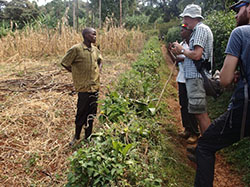 |
|
1 |
| Uganda N2Africa Partners plan for 2017 |
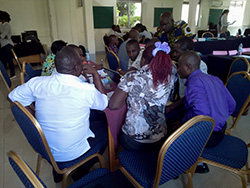 |
N2Africa Uganda Annual Planning was conducted at central Inn Entebbe from 23- 25th January 2017. The workshop brought together representatives from national partner organizations including the NGOs (Africa 2000 Uganda, Agency for Sustainable Rural Transformation, CARD Uganda, World Vision Uganda), research (Makerere University, and the National Agriculture Research Laboratories Kawanda, National Agriculture Crop Resources Research Institutes of NARO), the private sector (Simlaw Seeds and Agrinet, Network for Commercial Farming and Marketing (NECOFAM), Agricultural Innovation Systems Brokerage Association (AGINSBA) -ICT Platform for extension information access (M-Omulimisa) and the Ministry of Agriculture Animal Industry and Fisheries (MAAIF). ...
Image: Partners during a group session for joint development of 2017 work plans
|
|
2 |
| Multi-country study describes the distribution inoculation response across Africa |
|
The many on-farm trials implemented by N2Africa over the last six years provide a wealth of information on input responses across sub Saharan Africa. In a recently submitted study on soyabean we report on the patterns of inoculation response observed in a dataset of more than 2,000 trials, implemented in ten countries over six years. This study represents the largest effort so far to quantify the effect of inoculation as well as the variability in response at the plot and field level. ...
Figure: Cumulative distribution of predicted field-level responses (black) and observed responses at the experimental plot level (grey). Vertical dashed lines indicate the 25 kg ha-1 and 180 kg ha-1 points. The vertical dashed line marks the 50th percentile.
|
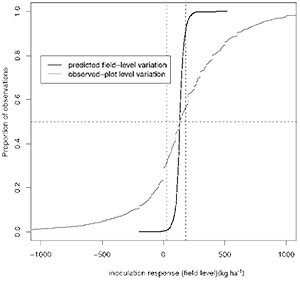
|
|
3 |
| MSc Internship N2Africa Review |
|
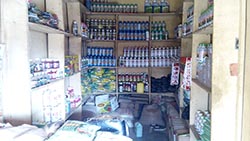
|
My MSc Internship was undertaken from October 2016 to January 2017 with the Plant Production Systems (PPS) chair group at Wageningen University & Research and the N2Africa project. The purpose of my MSc Internship was to review aspects of the N2Africa project. The review process comprised of two studies, the Public- Private Partnership (PPP) study and the Quick survey study. These two studies will feed into the N2Africa project’s Annual Reporting for 2016. ...
Image: Agrochemical and Fertilizer Sales Outlet (Belongs to Mallam Bello Mohammed), Kawo Market, Kaduna City, Kaduna State Country in Nigeria
|
|
4 |
| Rizobacter: Inoculants for Africa |
|
Rizobacter is an Argentinian company strongly committed to delivering sustainable solutions to farmers around the world. In Rizobacter´s 40-year history, excellence in quality and continuous innovation has been the forefront, enabling the company to develop state-of-the-art technologies in the formulation of liquid biological products. Strategic alliances with renowned companies, expanded the company´s product line to include adjuvants and crop nutrition products. Whether through its own subsidiaries or through local partners, Rizobacter has commercial presence in over 25 countries worldwide. ...
Image: Small-plot trial in Frankfort, South Africa testing Rizobacter´s inoculants for soyabean.
|
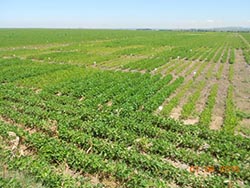 |
|
5 |
| Tackling some major constraints to climbing bean production in Uganda |
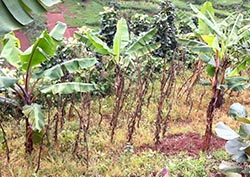 |
A year ago, I was in Uganda to study farmers’ adaptations of improved climbing bean technologies in the Eastern and Southwestern highlands. These improved technologies had been shown to farmers at N2Africa demonstration trials, and they tested the practices of their liking on their own land.
Skipping to one of the main findings: bean yields were not larger on plots where farmers tried some improved practices ...
Image: Damage by rats
|
|
6 |
| The GALA project: Gender and the Legume Alliance: Integrating multi-media communication approaches and input brokerage |
|
We recently asked our colleagues at N2Africa ‘is soyabean a woman’s crop?’ Ken Giller reminded us that we could not make generalizations – and that we had to explore the context and location to know.
For the Ghanaian context Samuel Adjei-Nsiah came back with a great answer. He told us soyabean was introduced in Ghana as far back as 1909. However it was never utilized in food preparations until recently, due to difficulty in processing it at the household level. Even now when it is being promoted as food crop, less than 5% of the crop is consumed at the household level. Recent interest in the cultivation of the crop by both men and women was mainly due to the availability of market. For women their interest lies in the fact that it could be produced easily with minimal external inputs. ...
Image: At inception event for GALA held at UDS in Tamale, Ghana in mid November
|
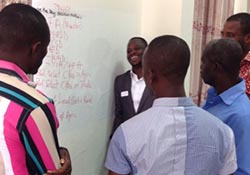 |
|
7 |
| A day in the life of N2Africa |
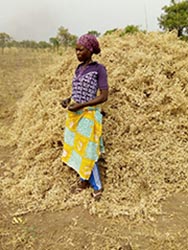 |
On the WhatsApp group of N2Africa a discussion showed up on February 1st 2017. We wanted to share it as it signals how we find issues that need attention.
Image: The woman is on strike - won’t thresh her soyabeans, why? Low market price..., low demand...
|
|
8 |
| N2Africa in the news |
In the Daily Trust an article was published on IITA working with N2Africa on a robust agricultural schema with Borno Youth resulting in reduction of unemployment.
For those reading Dutch: an article was published in het Algemeen Dagblad with the title “Vlinderbloempje als hoop voor Afrika” (Legume flower as hope for Africa) using a photo of beans in experiments of Edouard Rurangwa.
|
9 |
| Related newsletters |
|
10 |
| Related publications |
With the tremendous contributions made by dozens of pulse scientists from around the world, the final 10-Year Research Strategy for Pulse Crops was completed in December (see link). It shows a rich picture of the tremendous potential of pulse crops and the key arenas for research investment.
On January 18th it was Global Pulse Day and the social media campaign appeared to be a phenomenal success.
|
11 |
| Announcements |
Virtual symposium, “Nitrogen: At the Nexus Between Food Security and Sustainability.”
This on-line, real time symposium will be held on March 8 & 9, 2017 from 9am-11:30am US Pacific Time, and is hosted by Michael Udvardi of the Samuel Roberts Noble Foundation, USA, and John Peters of Washington State University, USA. ...
MOOC Feeding a Hungry Planet: Agriculture, Nutrition and Sustainability
The SDG Academy is launching a new MOOC (massive open online course) on March 20, 2017...
|
12 |









